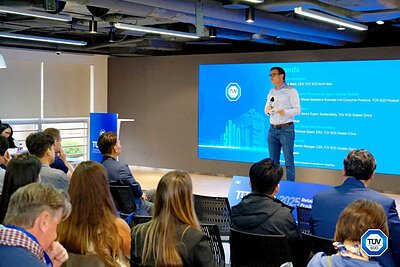
Beyond Compliance: TÜV SÜD Charts a Course for Sustainable & Secure Consumer Products
Rising regulations & consumer expectations are reshaping retail. TÜV SÜD’s ‘POWER 2030’ strategy focuses on proactive sustainability, cybersecurity, & a future where compliance isn't just a cost, but a competitive advantage.
Beyond Compliance: TÜV SÜD Charts a Course for Sustainable & Secure Consumer Products
Hong Kong – The retail and consumer product industries are facing a perfect storm of escalating regulations, increasingly sophisticated cyber threats, and heightened consumer demands for sustainability. Navigating this complex landscape requires more than just ticking boxes; it demands proactive strategies, robust testing, and a commitment to long-term resilience. At the recent 2025 Retail & Consumer Products Summit in Hong Kong, TÜV SÜD unveiled its ‘POWER 2030’ strategy, signaling a shift from reactive compliance to a holistic approach that prioritizes sustainability, cybersecurity, and strategic partnerships.
For nearly 160 years, TÜV SÜD has been synonymous with quality and safety. But as the industry evolves, so too must its approach. “Companies are realizing that compliance is no longer just about avoiding penalties; it's about building trust with consumers and securing a competitive advantage,” says an industry analyst familiar with TÜV SÜD’s strategic direction. “The costs of inaction – whether it’s a product recall due to safety concerns, a data breach, or failing to meet sustainability targets – are far greater than the investment in proactive measures.”
The Rising Cost of Compliance
The pressure on manufacturers is mounting. Regulations like the EU’s RED Delegated Act, which mandates stringent cybersecurity measures for connected devices, are adding complexity and cost. “The act is a game-changer,” explains a cybersecurity consultant. “Manufacturers need to rethink their product development lifecycle to integrate security from the outset.” The implementation is not without challenges; the rush to comply has created bottlenecks in certification processes and increased demand for specialized testing services.
Beyond cybersecurity, sustainability regulations are tightening. Scope 3 emissions – those generated throughout a company’s value chain – are coming under increasing scrutiny. While challenging to measure and manage, reducing Scope 3 emissions is becoming a critical requirement for companies seeking to attract environmentally conscious consumers and investors. “Companies are starting to realize that they can't just focus on their own operations,” says a supply chain expert. “They need to work with their suppliers to reduce emissions across the entire value chain.”
‘POWER 2030’: A Proactive Approach
TÜV SÜD’s ‘POWER 2030’ strategy is designed to address these challenges. The initiative focuses on three key pillars: digital innovation, integrated sustainability services, and strategic partnerships. By leveraging digital tools like AI and data analytics, TÜV SÜD aims to provide real-time insights into product safety, sustainability performance, and cybersecurity vulnerabilities.
“The goal is to move beyond traditional testing and certification to provide a continuous monitoring and improvement cycle,” explains a TÜV SÜD spokesperson. “We're investing heavily in digital technologies to help our clients identify and mitigate risks before they become problems.”
The strategy also emphasizes the importance of integrated sustainability services. TÜV SÜD is expanding its offerings to include carbon footprint assessments, lifecycle analyses, and supply chain audits to help companies reduce their environmental impact.
“Companies are realizing that sustainability is not just a cost of doing business; it's an opportunity to create value,” says an industry analyst. “Consumers are increasingly demanding sustainable products, and investors are rewarding companies that prioritize environmental responsibility.”
The Power of Partnerships
Recognizing that no single company can solve these complex challenges alone, TÜV SÜD is forging strategic partnerships with technology providers, industry associations, and research institutions. The company’s collaboration with the Hong Kong Productivity Council (HKPC) exemplifies this approach.
Together, TÜV SÜD and HKPC are developing innovative solutions for digital transformation, sustainability, and cybersecurity. One joint project focuses on creating a cybersecurity framework for smart devices, while another aims to develop a sustainability certification program for small and medium-sized enterprises (SMEs).
“Partnerships are essential for driving innovation and scaling solutions,” says a spokesperson for HKPC. “By combining our expertise and resources, we can help companies accelerate their journey towards sustainability and security.”
Beyond Compliance: A Competitive Advantage
The message from TÜV SÜD is clear: compliance is no longer enough. In today’s rapidly changing world, companies must embrace a proactive approach that prioritizes sustainability, cybersecurity, and strategic partnerships. Those that do will be well-positioned to thrive in the years ahead.
“The companies that see compliance not as a burden, but as an opportunity to innovate and create value, will be the winners,” says an industry consultant. “The future belongs to those who embrace sustainability and security as core business principles.”
As regulations tighten and consumer expectations rise, TÜV SÜD’s ‘POWER 2030’ strategy offers a roadmap for navigating the challenges and seizing the opportunities that lie ahead. The shift from reactive compliance to proactive resilience is not just a business imperative; it’s a pathway to a more sustainable and secure future.
